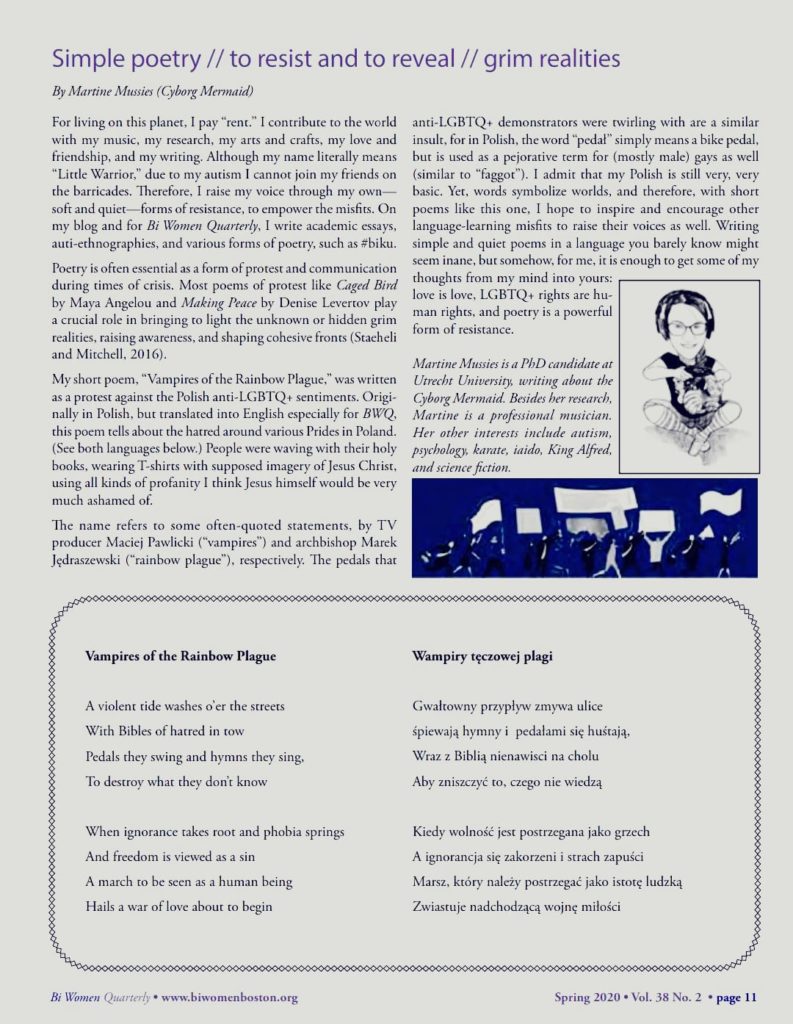Simple poetry // to resist and to reveal // grim realities

For living on this planet, I pay “rent” – I contribute to the world with my music, my research, my arts+crafts, my love & friendship, and my writing. Although my name literally means “Little Warrior”, due to my autism, I cannot join my friends on the barricades. Therefore, I raise my voice through my own – soft & quiet – forms of resistance, to empower the misfits. On my blog and for BiWomenQuarterly, I write academic essays, auti-ethnographies and various forms of poetry, such as #biku . This piece tells more about the traditions of poetry in which I place myself, to conclude with a short poem about the current situation in Poland – where the Prides meet many prejudices, and where dehumanizing language is dehumanizing us.
Originally written for Bi Women Quarterly aka BWQ.
Poetry is often essential and pursued during calamities in contemporary society. Concise and commanding, poems are a prevalent art system that surrounds complaints and assemblies. Lofland (2017) posits that, since the civil rights movement to the existing women’s liberty movements or the growing Black Lives Matter campaign, poetry is imposing as much as necessary to gain an audience that is compact to attain the requisite attention. Openly, Boehmer (2018) explicates that certainty to authority remains important responsibilities of all poets facing budding partisan and media arrogance planned to obscure, or gag. Most poems of protest like Caged Bird by Maya Angelou and Making Peace by Denise Levertov play a crucial role in bringing to light the unknown or hidden grim realities, raise awareness, and shape cohesive fronts (Staeheli and Mitchell, 2016). Likewise, other scholars insist as Conte (2016) writes, poetry as a form of protest is a well-designed move to do away with all walls of oppression; for that, Denise Levertov intreats, signifying that “to each act of existence” poetry aids in the cultivation of joint resistance. All rail in contradiction of complacency and validate why poetry is essential and required in protests or crisis.

Furthermore, Clery (2017) writes that poetry as a form of protest in crises or tyrannies facilitates the development of groups of solipsists or interactive links of like-minds that authorize each other’s expectations and partialities. As opposed to confronting conflicting outlooks, poetry offers sufficient room to protest against perceived vices in closed communities. Therefore, poetry as a form protest generally offers an enlightened thought in a cunning society (Warr, 2016). In fact, with the growth of misrepresentation, and the formation of siloed societies of like-minded individuals who constantly agree on several ideas, poetry comprehensively buttresses protests against vices. In a nutshell, as opposed to ununified ways of thinking, poetry reduces reinforces society’s entrenched feelings about particular negative subjects.
Vampires of the Rainbow Plague
Martine Mussies
A violent tide washes o’er the streets
With Bibles of hatred in tow
Pedals they swing and hymns they sing,
To destroy what they don’t know
When ignorance takes root and phobia springs
And freedom is viewed as a sin
A march to be seen as a human being
Hails a war of love about to begin
I decided to craft simple poetry to tickle people to challenge their thinking, for example about ways to see the religious treasures in my church through a contemporary feminist lens. As a reaction to some Dutch newspaper clippings about the nuisance costed by cats on the streets, I wrote a small and child-like haiku in three languages: Dutch (the language of the country I live in), English (the language shared by most of my friends) and Polish (the language I am learning at this moment). The short poem “Rainbow Plague” was written as a protest against the Polish anti-LGBTQ+ sentiments. Originally in Polish, but translated into English especially for BWQ, this poem tells about the hatred around various Gay Prides in Poland. People where waving with their holy books, wearing T-shirts with supposed imagery of Jesus Christ, scolding all kinds of profanity I think Jesus himself would be very much ashamed of. The name refers to some often quoted statements, by TV producer Maciej Pawlicki (“vampires”) and archbishop Marek Jędraszewski (“rainbow plague”) respectively. The pedals that anti-LGBTQ+ demonstrants were twirling with are a similar insult, for in Polish, the word “pedał” simply means a bike pedal, but is used as a pejorative term for (mostly male) gays as well (similar to “faggot”).
My Polish is still very, very basic; I just hook up words, and phrases, and causes, and am mainly using the language I learnt from watching TV shows in Polish (especially the Gummi Bears taught me many useful expressions). But words symbolize worlds, and therefore, with short poems like this one, I hope to inspire and encourage other language learning misfits to raise their voices as well. As a bonus, writing simple poems in your target language helps with learning, for these words are now assigned a social meaning and impact. Writing simple and quiet poems in a language you barely know might seem inane, but somehow, for me, it is enough to get some of my thoughts from my mind into yours: love is love, LGBTQ+ rights are human rights and poetry is a powerful form of resistance.
Wampiry tęczowej plagi
Martine Mussies
Gwałtowny przypływ zmywa ulice
śpiewają hymny i pedałami się huśtają,
Wraz z Biblią nienawisci na cholu
Aby zniszczyć to, czego nie wiedzą
Kiedy wolność jest postrzegana jako grzech
A ignorancja się zakorzeni i strach zapuści
Marsz, który należy postrzegać jako istotę ludzką
Zwiastuje nadchodzącą wojnę miłości
References
Boehmer, E. (2018). The Transformative Force of the Postcolonial Line: Protest Poetry and the Global Short Story. In Postcolonial Poetics. Palgrave Macmillan, Cham.
Clery, E. J. (2017). Eighteen hundred and eleven: poetry, protest and economic crisis (Vol. 116). Cambridge University Press.
Conte, J. M. (2016). Unending Design: The forms of postmodern poetry. Cornell University Press.
Lofland, J. (2017). Protest: Studies of collective behaviour and social movements. Routledge.
Staeheli, L., & Mitchell, D. (2016). The People’s Property? Power, Politics, and the Public. Routledge.
Warr, M. (Ed.). (2016). Of Poetry and Protest: From Emmett Till to Trayvon Martin. WW Norton & Company.
This blogpost was especially written for BiWomenQuarterly. If you like, you can read my other publications in BWQ, about women’s spaces (A safe place in space), about the intersections of my two invisible identities (Bisexuality + Autism), about my childhood experiences (First Love) and about my coming out (Me: bisexual).
Leave a Reply